Mental Health and Wellbeing Report: Analysis of Munny's Mental State
VerifiedAdded on 2022/12/01
|8
|2228
|275
Report
AI Summary
This report delves into a case study focusing on an individual named Munny, exploring his mental health and wellbeing. The analysis begins with defining mental illness and its impact on an individual's functioning, relationships, and ability to cope with adversity. The report examines Munny's mental state, highlighting his speech patterns, appearance, and behavior through a mental state examination (MSE). It identifies potential contributing factors to his condition, including workplace stress due to irregular working hours and past traumas like the death of his mother and experiences during the Khmer Rouge period. The report then discusses the principles of recovery, such as hope, empowerment, and respect, and how these can be applied to Munny's situation. It emphasizes the importance of seeking support, making meaningful choices, and fostering a positive outlook for a smoother path towards recovery. References to supporting studies are included.
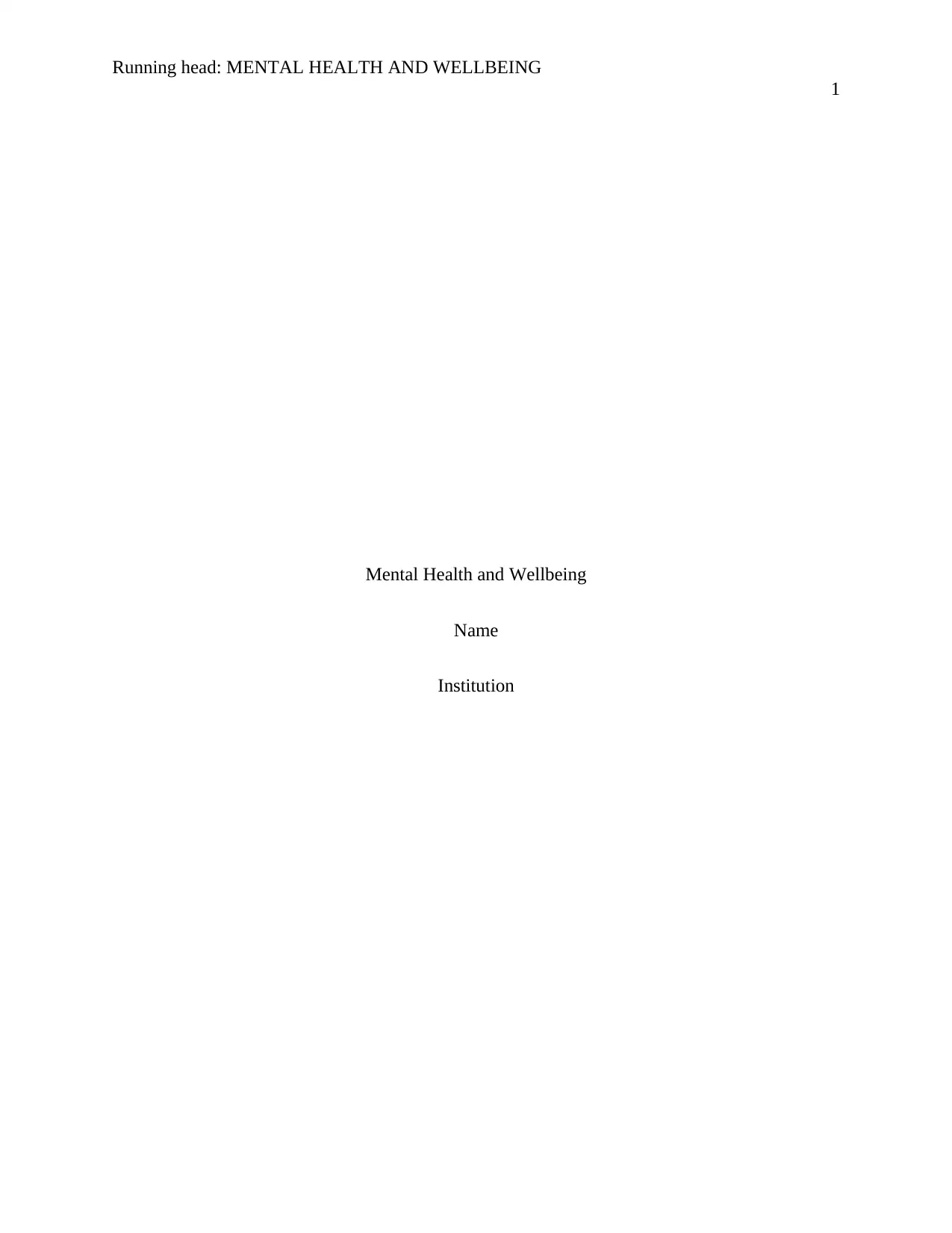
Running head: MENTAL HEALTH AND WELLBEING
1
Mental Health and Wellbeing
Name
Institution
1
Mental Health and Wellbeing
Name
Institution
Paraphrase This Document
Need a fresh take? Get an instant paraphrase of this document with our AI Paraphraser
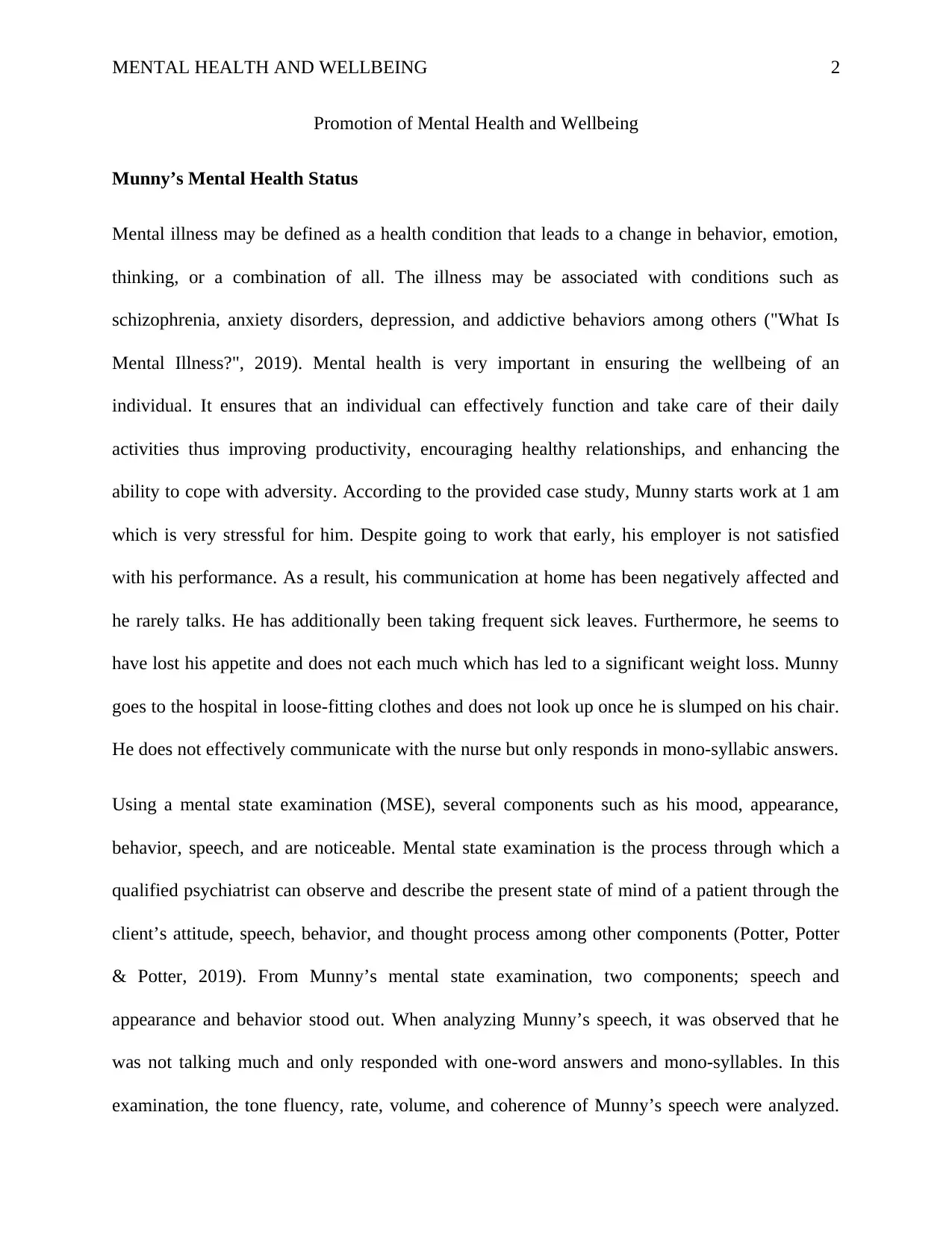
MENTAL HEALTH AND WELLBEING 2
Promotion of Mental Health and Wellbeing
Munny’s Mental Health Status
Mental illness may be defined as a health condition that leads to a change in behavior, emotion,
thinking, or a combination of all. The illness may be associated with conditions such as
schizophrenia, anxiety disorders, depression, and addictive behaviors among others ("What Is
Mental Illness?", 2019). Mental health is very important in ensuring the wellbeing of an
individual. It ensures that an individual can effectively function and take care of their daily
activities thus improving productivity, encouraging healthy relationships, and enhancing the
ability to cope with adversity. According to the provided case study, Munny starts work at 1 am
which is very stressful for him. Despite going to work that early, his employer is not satisfied
with his performance. As a result, his communication at home has been negatively affected and
he rarely talks. He has additionally been taking frequent sick leaves. Furthermore, he seems to
have lost his appetite and does not each much which has led to a significant weight loss. Munny
goes to the hospital in loose-fitting clothes and does not look up once he is slumped on his chair.
He does not effectively communicate with the nurse but only responds in mono-syllabic answers.
Using a mental state examination (MSE), several components such as his mood, appearance,
behavior, speech, and are noticeable. Mental state examination is the process through which a
qualified psychiatrist can observe and describe the present state of mind of a patient through the
client’s attitude, speech, behavior, and thought process among other components (Potter, Potter
& Potter, 2019). From Munny’s mental state examination, two components; speech and
appearance and behavior stood out. When analyzing Munny’s speech, it was observed that he
was not talking much and only responded with one-word answers and mono-syllables. In this
examination, the tone fluency, rate, volume, and coherence of Munny’s speech were analyzed.
Promotion of Mental Health and Wellbeing
Munny’s Mental Health Status
Mental illness may be defined as a health condition that leads to a change in behavior, emotion,
thinking, or a combination of all. The illness may be associated with conditions such as
schizophrenia, anxiety disorders, depression, and addictive behaviors among others ("What Is
Mental Illness?", 2019). Mental health is very important in ensuring the wellbeing of an
individual. It ensures that an individual can effectively function and take care of their daily
activities thus improving productivity, encouraging healthy relationships, and enhancing the
ability to cope with adversity. According to the provided case study, Munny starts work at 1 am
which is very stressful for him. Despite going to work that early, his employer is not satisfied
with his performance. As a result, his communication at home has been negatively affected and
he rarely talks. He has additionally been taking frequent sick leaves. Furthermore, he seems to
have lost his appetite and does not each much which has led to a significant weight loss. Munny
goes to the hospital in loose-fitting clothes and does not look up once he is slumped on his chair.
He does not effectively communicate with the nurse but only responds in mono-syllabic answers.
Using a mental state examination (MSE), several components such as his mood, appearance,
behavior, speech, and are noticeable. Mental state examination is the process through which a
qualified psychiatrist can observe and describe the present state of mind of a patient through the
client’s attitude, speech, behavior, and thought process among other components (Potter, Potter
& Potter, 2019). From Munny’s mental state examination, two components; speech and
appearance and behavior stood out. When analyzing Munny’s speech, it was observed that he
was not talking much and only responded with one-word answers and mono-syllables. In this
examination, the tone fluency, rate, volume, and coherence of Munny’s speech were analyzed.
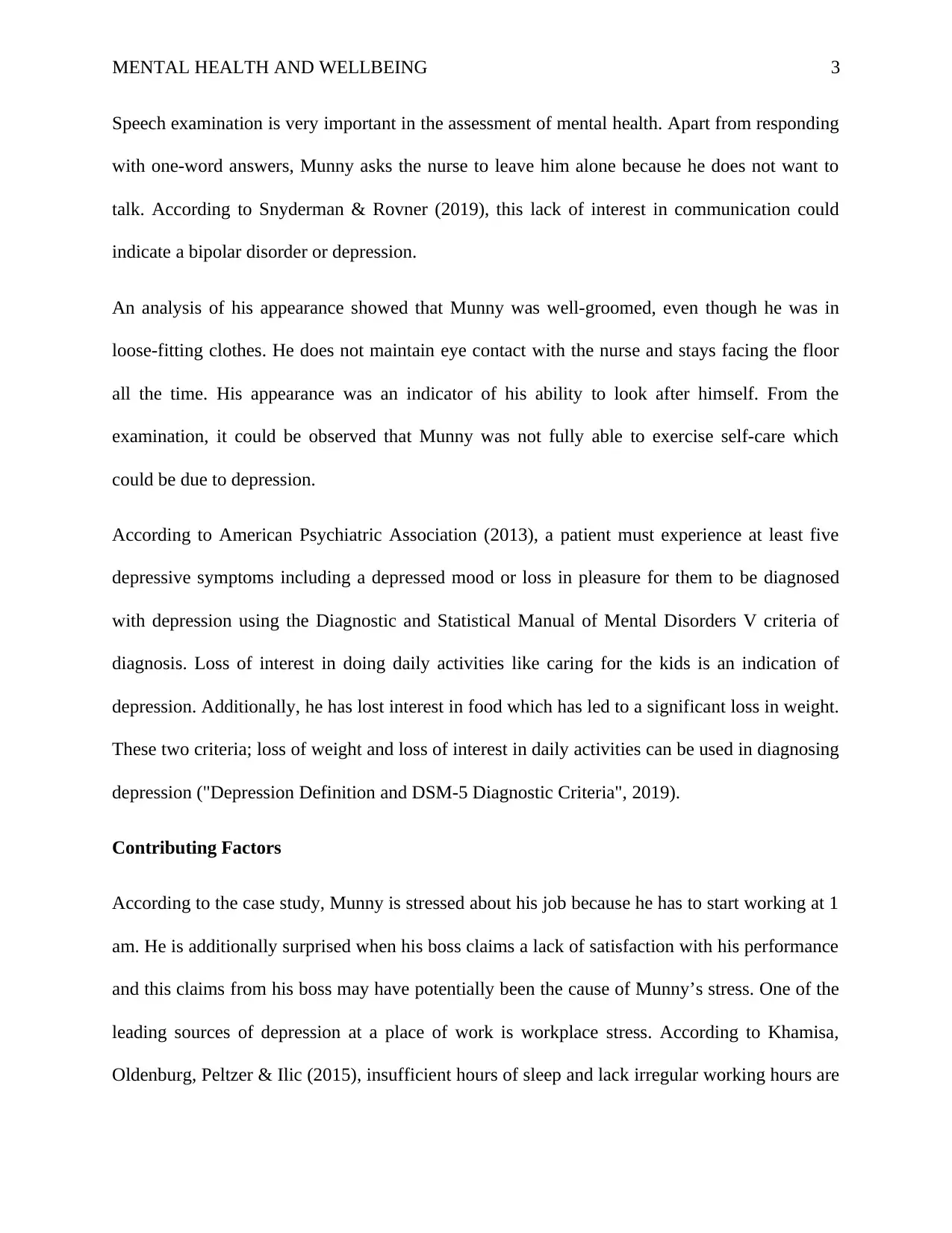
MENTAL HEALTH AND WELLBEING 3
Speech examination is very important in the assessment of mental health. Apart from responding
with one-word answers, Munny asks the nurse to leave him alone because he does not want to
talk. According to Snyderman & Rovner (2019), this lack of interest in communication could
indicate a bipolar disorder or depression.
An analysis of his appearance showed that Munny was well-groomed, even though he was in
loose-fitting clothes. He does not maintain eye contact with the nurse and stays facing the floor
all the time. His appearance was an indicator of his ability to look after himself. From the
examination, it could be observed that Munny was not fully able to exercise self-care which
could be due to depression.
According to American Psychiatric Association (2013), a patient must experience at least five
depressive symptoms including a depressed mood or loss in pleasure for them to be diagnosed
with depression using the Diagnostic and Statistical Manual of Mental Disorders V criteria of
diagnosis. Loss of interest in doing daily activities like caring for the kids is an indication of
depression. Additionally, he has lost interest in food which has led to a significant loss in weight.
These two criteria; loss of weight and loss of interest in daily activities can be used in diagnosing
depression ("Depression Definition and DSM-5 Diagnostic Criteria", 2019).
Contributing Factors
According to the case study, Munny is stressed about his job because he has to start working at 1
am. He is additionally surprised when his boss claims a lack of satisfaction with his performance
and this claims from his boss may have potentially been the cause of Munny’s stress. One of the
leading sources of depression at a place of work is workplace stress. According to Khamisa,
Oldenburg, Peltzer & Ilic (2015), insufficient hours of sleep and lack irregular working hours are
Speech examination is very important in the assessment of mental health. Apart from responding
with one-word answers, Munny asks the nurse to leave him alone because he does not want to
talk. According to Snyderman & Rovner (2019), this lack of interest in communication could
indicate a bipolar disorder or depression.
An analysis of his appearance showed that Munny was well-groomed, even though he was in
loose-fitting clothes. He does not maintain eye contact with the nurse and stays facing the floor
all the time. His appearance was an indicator of his ability to look after himself. From the
examination, it could be observed that Munny was not fully able to exercise self-care which
could be due to depression.
According to American Psychiatric Association (2013), a patient must experience at least five
depressive symptoms including a depressed mood or loss in pleasure for them to be diagnosed
with depression using the Diagnostic and Statistical Manual of Mental Disorders V criteria of
diagnosis. Loss of interest in doing daily activities like caring for the kids is an indication of
depression. Additionally, he has lost interest in food which has led to a significant loss in weight.
These two criteria; loss of weight and loss of interest in daily activities can be used in diagnosing
depression ("Depression Definition and DSM-5 Diagnostic Criteria", 2019).
Contributing Factors
According to the case study, Munny is stressed about his job because he has to start working at 1
am. He is additionally surprised when his boss claims a lack of satisfaction with his performance
and this claims from his boss may have potentially been the cause of Munny’s stress. One of the
leading sources of depression at a place of work is workplace stress. According to Khamisa,
Oldenburg, Peltzer & Ilic (2015), insufficient hours of sleep and lack irregular working hours are
⊘ This is a preview!⊘
Do you want full access?
Subscribe today to unlock all pages.

Trusted by 1+ million students worldwide
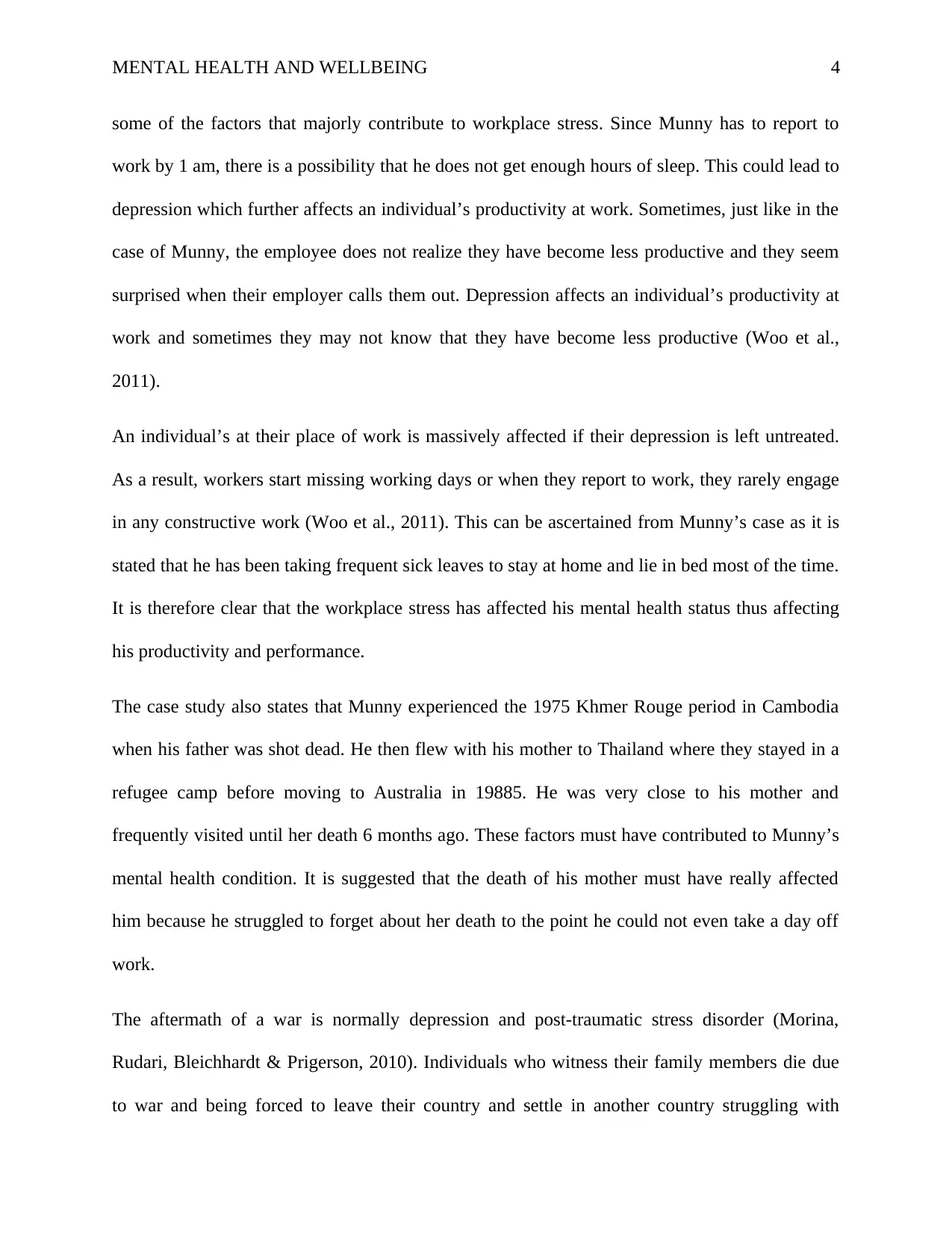
MENTAL HEALTH AND WELLBEING 4
some of the factors that majorly contribute to workplace stress. Since Munny has to report to
work by 1 am, there is a possibility that he does not get enough hours of sleep. This could lead to
depression which further affects an individual’s productivity at work. Sometimes, just like in the
case of Munny, the employee does not realize they have become less productive and they seem
surprised when their employer calls them out. Depression affects an individual’s productivity at
work and sometimes they may not know that they have become less productive (Woo et al.,
2011).
An individual’s at their place of work is massively affected if their depression is left untreated.
As a result, workers start missing working days or when they report to work, they rarely engage
in any constructive work (Woo et al., 2011). This can be ascertained from Munny’s case as it is
stated that he has been taking frequent sick leaves to stay at home and lie in bed most of the time.
It is therefore clear that the workplace stress has affected his mental health status thus affecting
his productivity and performance.
The case study also states that Munny experienced the 1975 Khmer Rouge period in Cambodia
when his father was shot dead. He then flew with his mother to Thailand where they stayed in a
refugee camp before moving to Australia in 19885. He was very close to his mother and
frequently visited until her death 6 months ago. These factors must have contributed to Munny’s
mental health condition. It is suggested that the death of his mother must have really affected
him because he struggled to forget about her death to the point he could not even take a day off
work.
The aftermath of a war is normally depression and post-traumatic stress disorder (Morina,
Rudari, Bleichhardt & Prigerson, 2010). Individuals who witness their family members die due
to war and being forced to leave their country and settle in another country struggling with
some of the factors that majorly contribute to workplace stress. Since Munny has to report to
work by 1 am, there is a possibility that he does not get enough hours of sleep. This could lead to
depression which further affects an individual’s productivity at work. Sometimes, just like in the
case of Munny, the employee does not realize they have become less productive and they seem
surprised when their employer calls them out. Depression affects an individual’s productivity at
work and sometimes they may not know that they have become less productive (Woo et al.,
2011).
An individual’s at their place of work is massively affected if their depression is left untreated.
As a result, workers start missing working days or when they report to work, they rarely engage
in any constructive work (Woo et al., 2011). This can be ascertained from Munny’s case as it is
stated that he has been taking frequent sick leaves to stay at home and lie in bed most of the time.
It is therefore clear that the workplace stress has affected his mental health status thus affecting
his productivity and performance.
The case study also states that Munny experienced the 1975 Khmer Rouge period in Cambodia
when his father was shot dead. He then flew with his mother to Thailand where they stayed in a
refugee camp before moving to Australia in 19885. He was very close to his mother and
frequently visited until her death 6 months ago. These factors must have contributed to Munny’s
mental health condition. It is suggested that the death of his mother must have really affected
him because he struggled to forget about her death to the point he could not even take a day off
work.
The aftermath of a war is normally depression and post-traumatic stress disorder (Morina,
Rudari, Bleichhardt & Prigerson, 2010). Individuals who witness their family members die due
to war and being forced to leave their country and settle in another country struggling with
Paraphrase This Document
Need a fresh take? Get an instant paraphrase of this document with our AI Paraphraser
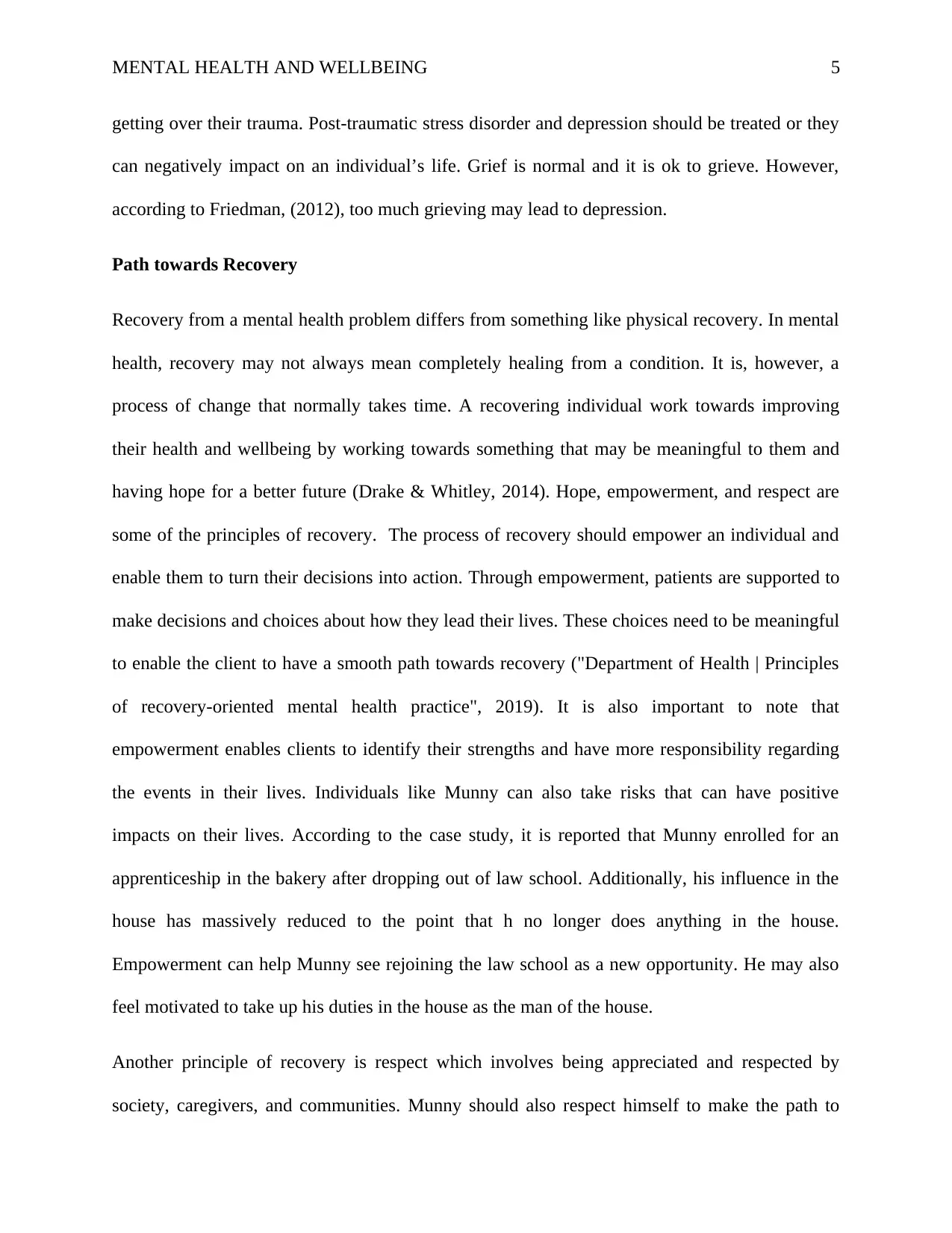
MENTAL HEALTH AND WELLBEING 5
getting over their trauma. Post-traumatic stress disorder and depression should be treated or they
can negatively impact on an individual’s life. Grief is normal and it is ok to grieve. However,
according to Friedman, (2012), too much grieving may lead to depression.
Path towards Recovery
Recovery from a mental health problem differs from something like physical recovery. In mental
health, recovery may not always mean completely healing from a condition. It is, however, a
process of change that normally takes time. A recovering individual work towards improving
their health and wellbeing by working towards something that may be meaningful to them and
having hope for a better future (Drake & Whitley, 2014). Hope, empowerment, and respect are
some of the principles of recovery. The process of recovery should empower an individual and
enable them to turn their decisions into action. Through empowerment, patients are supported to
make decisions and choices about how they lead their lives. These choices need to be meaningful
to enable the client to have a smooth path towards recovery ("Department of Health | Principles
of recovery-oriented mental health practice", 2019). It is also important to note that
empowerment enables clients to identify their strengths and have more responsibility regarding
the events in their lives. Individuals like Munny can also take risks that can have positive
impacts on their lives. According to the case study, it is reported that Munny enrolled for an
apprenticeship in the bakery after dropping out of law school. Additionally, his influence in the
house has massively reduced to the point that h no longer does anything in the house.
Empowerment can help Munny see rejoining the law school as a new opportunity. He may also
feel motivated to take up his duties in the house as the man of the house.
Another principle of recovery is respect which involves being appreciated and respected by
society, caregivers, and communities. Munny should also respect himself to make the path to
getting over their trauma. Post-traumatic stress disorder and depression should be treated or they
can negatively impact on an individual’s life. Grief is normal and it is ok to grieve. However,
according to Friedman, (2012), too much grieving may lead to depression.
Path towards Recovery
Recovery from a mental health problem differs from something like physical recovery. In mental
health, recovery may not always mean completely healing from a condition. It is, however, a
process of change that normally takes time. A recovering individual work towards improving
their health and wellbeing by working towards something that may be meaningful to them and
having hope for a better future (Drake & Whitley, 2014). Hope, empowerment, and respect are
some of the principles of recovery. The process of recovery should empower an individual and
enable them to turn their decisions into action. Through empowerment, patients are supported to
make decisions and choices about how they lead their lives. These choices need to be meaningful
to enable the client to have a smooth path towards recovery ("Department of Health | Principles
of recovery-oriented mental health practice", 2019). It is also important to note that
empowerment enables clients to identify their strengths and have more responsibility regarding
the events in their lives. Individuals like Munny can also take risks that can have positive
impacts on their lives. According to the case study, it is reported that Munny enrolled for an
apprenticeship in the bakery after dropping out of law school. Additionally, his influence in the
house has massively reduced to the point that h no longer does anything in the house.
Empowerment can help Munny see rejoining the law school as a new opportunity. He may also
feel motivated to take up his duties in the house as the man of the house.
Another principle of recovery is respect which involves being appreciated and respected by
society, caregivers, and communities. Munny should also respect himself to make the path to
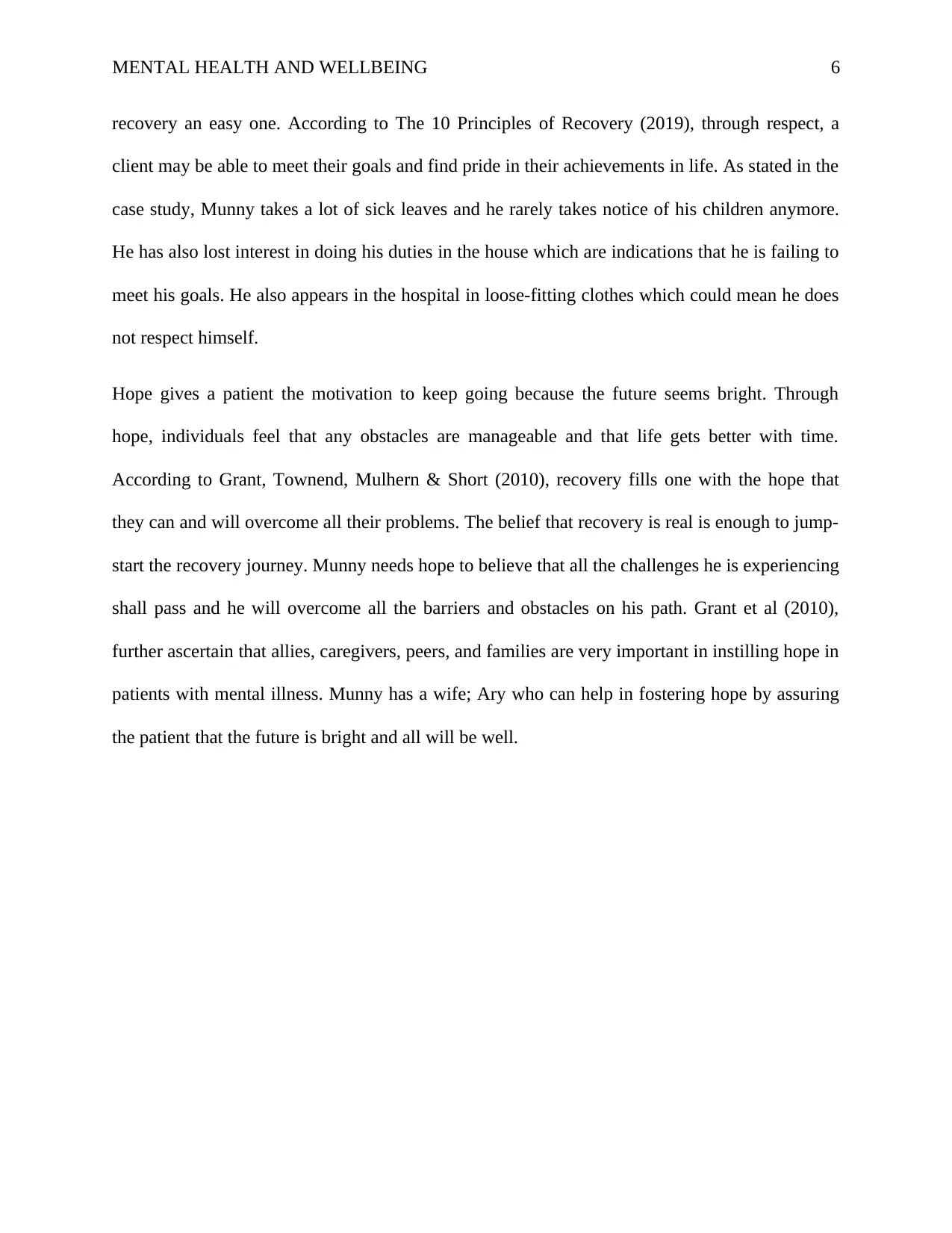
MENTAL HEALTH AND WELLBEING 6
recovery an easy one. According to The 10 Principles of Recovery (2019), through respect, a
client may be able to meet their goals and find pride in their achievements in life. As stated in the
case study, Munny takes a lot of sick leaves and he rarely takes notice of his children anymore.
He has also lost interest in doing his duties in the house which are indications that he is failing to
meet his goals. He also appears in the hospital in loose-fitting clothes which could mean he does
not respect himself.
Hope gives a patient the motivation to keep going because the future seems bright. Through
hope, individuals feel that any obstacles are manageable and that life gets better with time.
According to Grant, Townend, Mulhern & Short (2010), recovery fills one with the hope that
they can and will overcome all their problems. The belief that recovery is real is enough to jump-
start the recovery journey. Munny needs hope to believe that all the challenges he is experiencing
shall pass and he will overcome all the barriers and obstacles on his path. Grant et al (2010),
further ascertain that allies, caregivers, peers, and families are very important in instilling hope in
patients with mental illness. Munny has a wife; Ary who can help in fostering hope by assuring
the patient that the future is bright and all will be well.
recovery an easy one. According to The 10 Principles of Recovery (2019), through respect, a
client may be able to meet their goals and find pride in their achievements in life. As stated in the
case study, Munny takes a lot of sick leaves and he rarely takes notice of his children anymore.
He has also lost interest in doing his duties in the house which are indications that he is failing to
meet his goals. He also appears in the hospital in loose-fitting clothes which could mean he does
not respect himself.
Hope gives a patient the motivation to keep going because the future seems bright. Through
hope, individuals feel that any obstacles are manageable and that life gets better with time.
According to Grant, Townend, Mulhern & Short (2010), recovery fills one with the hope that
they can and will overcome all their problems. The belief that recovery is real is enough to jump-
start the recovery journey. Munny needs hope to believe that all the challenges he is experiencing
shall pass and he will overcome all the barriers and obstacles on his path. Grant et al (2010),
further ascertain that allies, caregivers, peers, and families are very important in instilling hope in
patients with mental illness. Munny has a wife; Ary who can help in fostering hope by assuring
the patient that the future is bright and all will be well.
⊘ This is a preview!⊘
Do you want full access?
Subscribe today to unlock all pages.

Trusted by 1+ million students worldwide
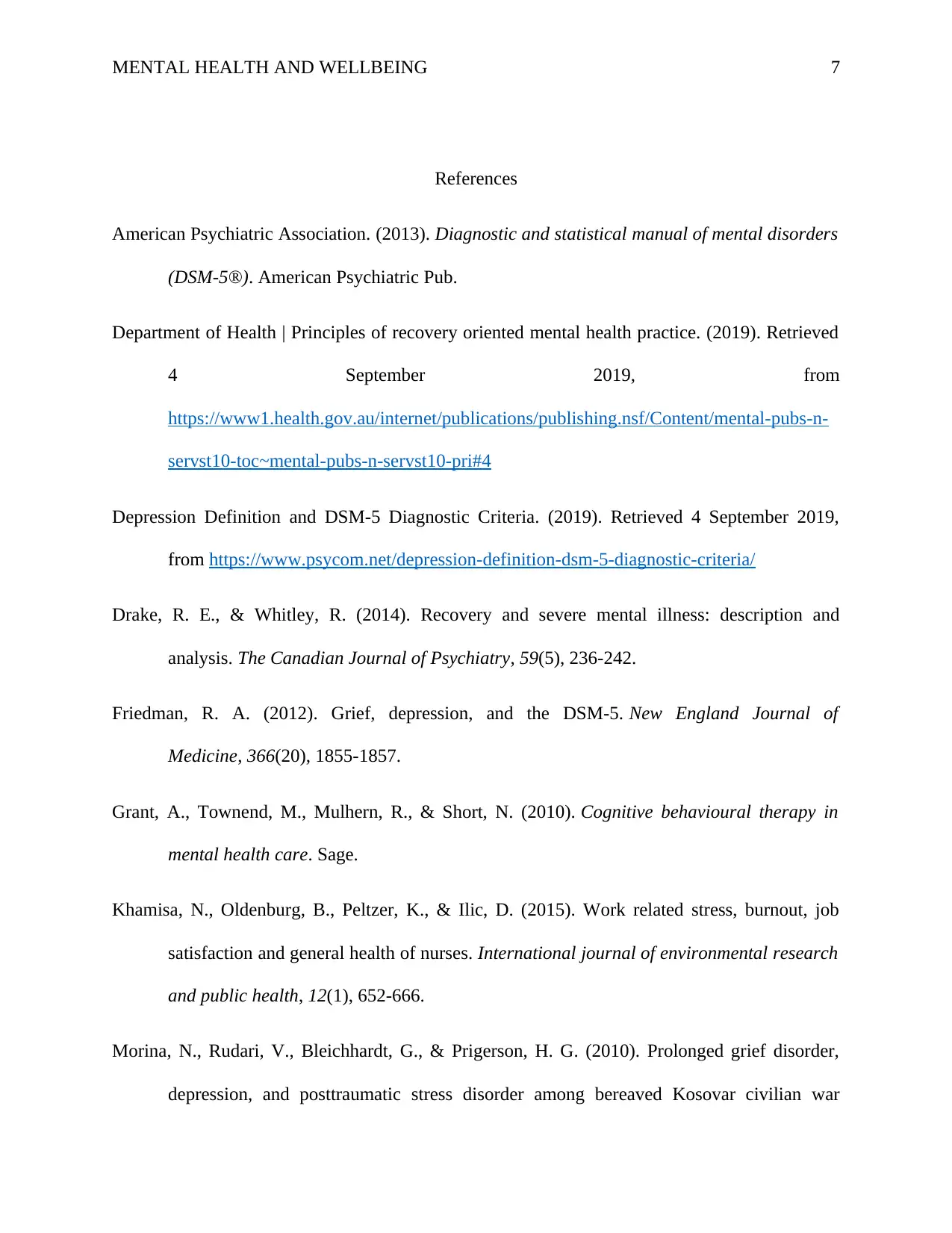
MENTAL HEALTH AND WELLBEING 7
References
American Psychiatric Association. (2013). Diagnostic and statistical manual of mental disorders
(DSM-5®). American Psychiatric Pub.
Department of Health | Principles of recovery oriented mental health practice. (2019). Retrieved
4 September 2019, from
https://www1.health.gov.au/internet/publications/publishing.nsf/Content/mental-pubs-n-
servst10-toc~mental-pubs-n-servst10-pri#4
Depression Definition and DSM-5 Diagnostic Criteria. (2019). Retrieved 4 September 2019,
from https://www.psycom.net/depression-definition-dsm-5-diagnostic-criteria/
Drake, R. E., & Whitley, R. (2014). Recovery and severe mental illness: description and
analysis. The Canadian Journal of Psychiatry, 59(5), 236-242.
Friedman, R. A. (2012). Grief, depression, and the DSM-5. New England Journal of
Medicine, 366(20), 1855-1857.
Grant, A., Townend, M., Mulhern, R., & Short, N. (2010). Cognitive behavioural therapy in
mental health care. Sage.
Khamisa, N., Oldenburg, B., Peltzer, K., & Ilic, D. (2015). Work related stress, burnout, job
satisfaction and general health of nurses. International journal of environmental research
and public health, 12(1), 652-666.
Morina, N., Rudari, V., Bleichhardt, G., & Prigerson, H. G. (2010). Prolonged grief disorder,
depression, and posttraumatic stress disorder among bereaved Kosovar civilian war
References
American Psychiatric Association. (2013). Diagnostic and statistical manual of mental disorders
(DSM-5®). American Psychiatric Pub.
Department of Health | Principles of recovery oriented mental health practice. (2019). Retrieved
4 September 2019, from
https://www1.health.gov.au/internet/publications/publishing.nsf/Content/mental-pubs-n-
servst10-toc~mental-pubs-n-servst10-pri#4
Depression Definition and DSM-5 Diagnostic Criteria. (2019). Retrieved 4 September 2019,
from https://www.psycom.net/depression-definition-dsm-5-diagnostic-criteria/
Drake, R. E., & Whitley, R. (2014). Recovery and severe mental illness: description and
analysis. The Canadian Journal of Psychiatry, 59(5), 236-242.
Friedman, R. A. (2012). Grief, depression, and the DSM-5. New England Journal of
Medicine, 366(20), 1855-1857.
Grant, A., Townend, M., Mulhern, R., & Short, N. (2010). Cognitive behavioural therapy in
mental health care. Sage.
Khamisa, N., Oldenburg, B., Peltzer, K., & Ilic, D. (2015). Work related stress, burnout, job
satisfaction and general health of nurses. International journal of environmental research
and public health, 12(1), 652-666.
Morina, N., Rudari, V., Bleichhardt, G., & Prigerson, H. G. (2010). Prolonged grief disorder,
depression, and posttraumatic stress disorder among bereaved Kosovar civilian war
Paraphrase This Document
Need a fresh take? Get an instant paraphrase of this document with our AI Paraphraser
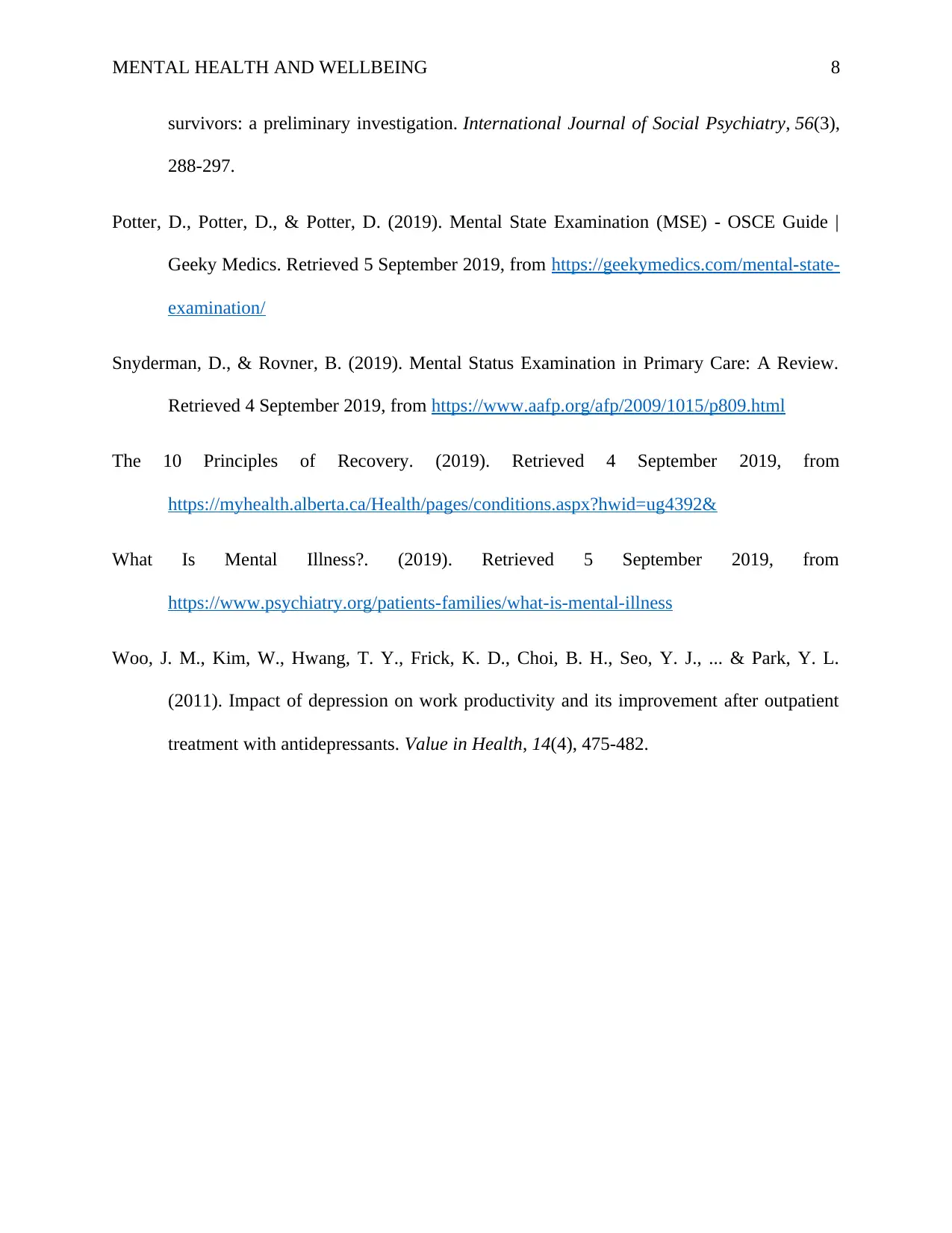
MENTAL HEALTH AND WELLBEING 8
survivors: a preliminary investigation. International Journal of Social Psychiatry, 56(3),
288-297.
Potter, D., Potter, D., & Potter, D. (2019). Mental State Examination (MSE) - OSCE Guide |
Geeky Medics. Retrieved 5 September 2019, from https://geekymedics.com/mental-state-
examination/
Snyderman, D., & Rovner, B. (2019). Mental Status Examination in Primary Care: A Review.
Retrieved 4 September 2019, from https://www.aafp.org/afp/2009/1015/p809.html
The 10 Principles of Recovery. (2019). Retrieved 4 September 2019, from
https://myhealth.alberta.ca/Health/pages/conditions.aspx?hwid=ug4392&
What Is Mental Illness?. (2019). Retrieved 5 September 2019, from
https://www.psychiatry.org/patients-families/what-is-mental-illness
Woo, J. M., Kim, W., Hwang, T. Y., Frick, K. D., Choi, B. H., Seo, Y. J., ... & Park, Y. L.
(2011). Impact of depression on work productivity and its improvement after outpatient
treatment with antidepressants. Value in Health, 14(4), 475-482.
survivors: a preliminary investigation. International Journal of Social Psychiatry, 56(3),
288-297.
Potter, D., Potter, D., & Potter, D. (2019). Mental State Examination (MSE) - OSCE Guide |
Geeky Medics. Retrieved 5 September 2019, from https://geekymedics.com/mental-state-
examination/
Snyderman, D., & Rovner, B. (2019). Mental Status Examination in Primary Care: A Review.
Retrieved 4 September 2019, from https://www.aafp.org/afp/2009/1015/p809.html
The 10 Principles of Recovery. (2019). Retrieved 4 September 2019, from
https://myhealth.alberta.ca/Health/pages/conditions.aspx?hwid=ug4392&
What Is Mental Illness?. (2019). Retrieved 5 September 2019, from
https://www.psychiatry.org/patients-families/what-is-mental-illness
Woo, J. M., Kim, W., Hwang, T. Y., Frick, K. D., Choi, B. H., Seo, Y. J., ... & Park, Y. L.
(2011). Impact of depression on work productivity and its improvement after outpatient
treatment with antidepressants. Value in Health, 14(4), 475-482.
1 out of 8
Related Documents
Your All-in-One AI-Powered Toolkit for Academic Success.
+13062052269
info@desklib.com
Available 24*7 on WhatsApp / Email
![[object Object]](/_next/static/media/star-bottom.7253800d.svg)
Unlock your academic potential
Copyright © 2020–2026 A2Z Services. All Rights Reserved. Developed and managed by ZUCOL.





